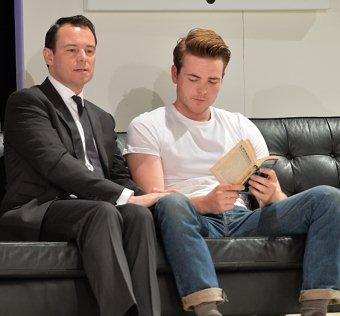Epstein: The Man Who Made The Beatles Review
The semi-biographical play 'Epstein: The Man Who Made the Beatles' seeks to try and lift some of the mystique of the famous manager Brian Epstein, a man who with no agent management experience, went on to help make The Beatles the biggest pop sensation the world had, and many would say has, ever seen. Yet Epstein remains a contested character: a homosexual Jew; emotionally unstable; and with an ever growing dependency on amphetamines, alcohol and later drugs, who died of an accidental drug overdose at the age of 32.
In Andrew Sherlock's two-man play, we encounter Epstein shortly before his death. He has 'picked-up' a young man, 'This Boy,' who he has taken back to his apartment for what he hopes will be a sexual encounter. But Epstein is forever cautious and initially ill-at-ease with the presence of the young man he has invited into his home: homosexuality had only just been decriminalised but still socially scorned, and the press were after an 'exposure' on the 'Real Epstein', especially since his influence on The Beatles was now on the wane.
Epstein, obviously captivated by 'This Boys' looks, youth and vitality - something that the play implies Epstein feels he never truly had himself - suspects he has only agreed to come home with him to either steal from or exploit him in some way. Indeed it is when Epstein wrongly accuses the boy of stealing an expensive cigarette lighter and a fight breaks out that we get our first encounter with Epstein's troubled soul, as he pleads for 'this boy' to hit him.
This boy we quickly discover is a wannabe journalist, and he tells Epstein that he wants to do a piece on the real Epstein. Not the Epstein who discovered the Beatles, but Epstein the person, and with his sweet smile and winning ways, he slowly gets Epstein to talk about his life. However, this is where the play fails. In an opening monologue before the first act begins, 'This Boy' tells the audience that if we have come here to learn about the Beetles manager, to hear an Epsteineing selection of Beatles music, then we have come to the wrong play, as this play is about Epstein the man.
Sadly, we do not learn anything new about Epstein the man, instead we are told what amounts to a list of facts about Epstein that are already well known to any Beetles fan: of how he became the director of NEMS (North End Music Store), was taken to the Cavern Club to listen to the then almost unknown group The Beatles and signed them up; wore himself out trudging through the streets of London searching for a Record Label that would produced their first album; his homosexuality; drugs; and depression.
Despite this central failing, the play is still a fascinating encounter with the history of Epstein and the early Beatles, especially since the acting by Andrew Lancel as 'Brian Epstein' is mesmerising. Lancel manages to portray loneliness, fear and desperation of Epstein, without destroying the determination and hope that made him the man who discovered The Beatles. Throughout his performance Lancel shows that he is more than capable of creating a more rounded character if the playwright had taken the time to make his Epstein a more fully fleshed individual - even if it would only be one based on the playwright's imagination - rather than the caricature that was often presented on stage.
Will Finlason has a more difficult role; 'This Boy' is a composite of all the young men in Epstein's life. His one character has to play the potential bully, the alluring lover, the ambitious careerist, the wannabe musician, all the things that so enticed Epstein to young men, and he succeeds in each, without losing his overall portrayal of a young man who remains in awe of the fact he his spending an evening in the company of his hero Epstein.
This Epstein is summed up by "This Boy", who after listening to Epstein talk about his discovery of The Beatles and how they made Epstein feel, responds, "It's called love!" And in this portrayal Epstein loved The Beetles and known he was losing them he withdrew to the lonely, sullen and unhappy person he was before that fateful night in the Cavern Club when he discovered them.
Originally published on
